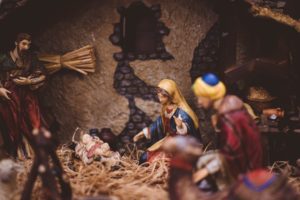How C.S. Lewis Wrecked My American Christmas
I grew up dreaming of a white Christmas with Bing Crosby and Rosemary Clooney. Christmas was about red, green and white. It was about lights on houses, displays in stores and snowy weather. Christmas was a time of stressful hurrying about to make the desserts, see the family, give to charity, wrap up school work, find the perfect presents and watch that newest movie on which I waited all year. It was about parties and friends and church musicals. Oh…and it was also about Jesus. As the slogan reminds me, “Jesus is the reason for the season.” Of course “Jesus is the reason,” but there were also so many expectations this time of year. Specifically, and prominently, there were my expectations of the holidays. All of these things seem to stem from traditions to which I have clung from childhood to the present. I wanted to feel a certain way, and I was going to pursue that feeling at all costs.
also so many expectations this time of year. Specifically, and prominently, there were my expectations of the holidays. All of these things seem to stem from traditions to which I have clung from childhood to the present. I wanted to feel a certain way, and I was going to pursue that feeling at all costs.
Yet something unexpected happened this holiday season. I finished reading The Space Trilogy by C.S. Lewis and his writing interrupted my entire holiday mindset. What did he do? Let me share three ways Lewis wrecked my American Christmas.
1) Lewis made me aware that what I thought I had to do, or had to have, during the holidays was all a pretense; traditions taking the place of real contentment and joy.
Traditions, in of themselves, are not inherently bad, but I hadn’t realized how much I was clinging to American Christmas ideology and visions for my happiness[1] at this time of year. All of these traditions should serve as signposts pointing toward the source of the traditions. Instead, the signposts have been replacing the source of joy. Lewis’ writing helped me to reflect upon my abuse of the traditions in the place of the source. He helped me to understand my humanity in a fallen world. From what or whom, exactly, do humans derive their contentedness? Where can I find real joy? Would I even recognize real joy? Even the human vision of what is beautiful and good has become distorted. Christmas should be a reminder of the pure goodness, beauty and joy found in the nature of God; a momentary vision of restoration.
2) Lewis made me long for an advent that was deeper and more mysterious than my wish to have family, quiet and the perfect gifts.
Every year, I seem to slam into the holidays with my head spinning. I rarely get a moment to process the meaning of Christmas, of the Incarnation of God. This time of year is the time to pull back the curtain of American culture—the heavy veil of individualistic desire—and to gaze upon the real story, salvation history. What was God doing so many years ago? Why did He send the second person of the Trinity as incarnate on earth? How does this act make a  difference in my life? Where do I fit into the story of God’s redemption on earth? What does His gift mean for those around me? These are the questions of the Christmas mystery. God gave us the perfect gift of Himself, in a way that we didn’t expect. Nothing else I can procure or produce at Christmastime comes close to the vision of God’s act of beauty and goodness: His gift of peace on earth and His goodwill towards men.
difference in my life? Where do I fit into the story of God’s redemption on earth? What does His gift mean for those around me? These are the questions of the Christmas mystery. God gave us the perfect gift of Himself, in a way that we didn’t expect. Nothing else I can procure or produce at Christmastime comes close to the vision of God’s act of beauty and goodness: His gift of peace on earth and His goodwill towards men.
3) Lewis gave me a sense of longing for another world of which I’ve never felt before. Everything else fades before the desire welling up in me for the goodness of His presence.
While I won’t trash all my American Christmas traditions, I will definitely enter into the season with a bit more caution for how I view and participate in those traditions. If I must have anything other than the beauty and wonder of the Lord Jesus in order to fulfill my heart at this time of year (that pumpkin spice latte, family gathering, or pristinely decorated tree), I have made that thing an idol; no matter how innocuous the thing appears.
So perhaps Lewis didn’t wreck my American Christmas but rather salvaged it by reminding me of the source of joy. Therefore, I’ll sing those holiday songs, decorate with red, white, and green, grab that perfect gift for someone I love…and do all things as a reflection of the goodness of God’s redemptive act in human history. Let the love that God has for you affect all those around you. Be reminded that God came into darkness as glorious light. He broke into our kingdom with his own kingdom. This season we celebrate the goodness of God. We celebrate His love of the creation.
[1] Not to mention the problem of seeking happiness, which itself comes with so much cultural baggage.

